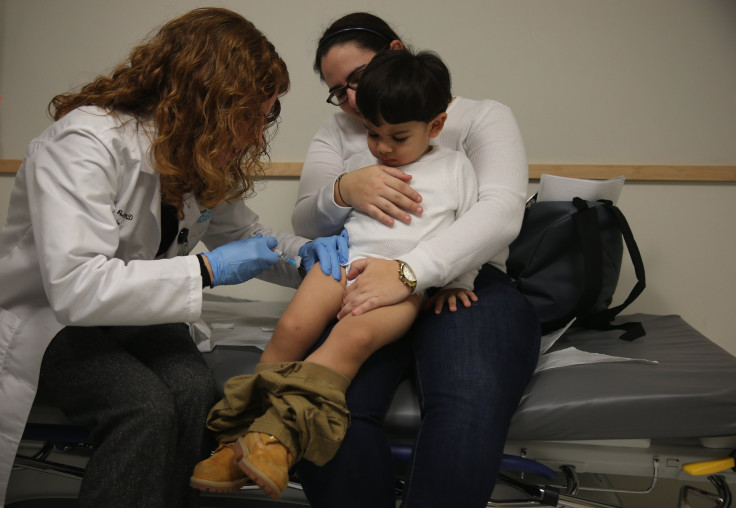1 In 5 Pediatricians Refuse To Deal With Unvaccinated Children; Mostly Common In States That Allow Exemptions

According to a new survey published Monday in Pediatrics, nearly all pediatricians and family physicians have had to deal with parents who refuse to vaccinate their children. And as a result, about one-fifth of pediatricians have refused to continue serving as their family’s health care providers.
The study authors, in collaboration with the Centers for Disease Control and Prevention (CDC), conducted a nationwide poll of 534 pediatricians and family physicians who belonged to the American Academy of Pediatrics (AAP) and the American Academy of Family Physicians (AAFP) respectively from June to November 2012. They found that in a typical month, 83 percent of these physicians reported encountering at least one instance of vaccine refusal among their patients, and one-fifth reported that 5 percent or more of the parents they dealt with took a staunch stance against vaccination.
When faced with refusal, 51 percent of physicians asked the parents to sign a form explicitly reminding them of the very real danger that comes with not vaccinating their children — a danger perhaps best emphasized by the multistate measles outbreak in 2014 that ultimately infected at least 113, mostly unvaccinated, people. While family physicians rarely dismissed these families from their practice (4 percent), 21 percent of pediatricians always or often told them to go elsewhere for their medical care. Even among the latter group, however, there were particular factors that likely influenced their decision.
“[Pediatricians] who dismiss families for vaccine refusal are more likely to practice in a private setting, to be from the South, and to be in states without philosophical exemption laws and/or with more difficult exemption policies,” the authors concluded. These exemption laws, which exist in 20 states, allow parents to have their children attend school without obtaining their mandatory vaccinations (religious and medical exemption laws exist as well but are typically accepted in every state and require more objective evidence for them to be granted). Though coming as no surprise, these exemption states have a vaccine refusal rate 2.5 times higher than elsewhere, according to research cited by Pew Charitable Trusts.
Dismissal of families for vaccine refusal is a controversial step that has been discouraged by the AAP and the CDC alike for years, yet as the researchers note, it’s one borne out of pediatricians’ growing frustration. Outbreaks of nearly non-existent childhood diseases like pertussis or measles have continued to increase over the past few years, but there’s been little success in devising communication strategies to convince anti-vaccination parents to think otherwise. Doctors have also cited the risk of purposefully unvaccinated children in their office infecting those who still haven’t gotten their shots as a reason for their refusal to treat them any further.
For their part, the authors didn’t find evidence that the practice of dismissal was necessarily harmful to the greater public health.
“Some have hypothesized that dismissing families could lead to increased clustering of vaccine refusing families within certain regions, leading to outbreaks of vaccine-preventable diseases,” the authors explained. “Our finding argues against this hypothesis because lower vaccination rates and higher rates of vaccine-preventable diseases tend to be in states in which physicians are less likely to dismiss families.”
The authors do caution that little research has been done on what happens to these dismissed families after they leave the office and on vaccine refusal in general. “Because many pediatricians still dismiss families despite recommendations to the contrary, this practice should be better explored and understood both for its causes and its intended and unintended consequences,” they concluded.
Source: O’Leary S, Allison M, Fisher A, et al. Characteristics of Physicians Who Dismiss Families for Refusing Vaccines. Pediatrics. 2015.
Published by Medicaldaily.com



























